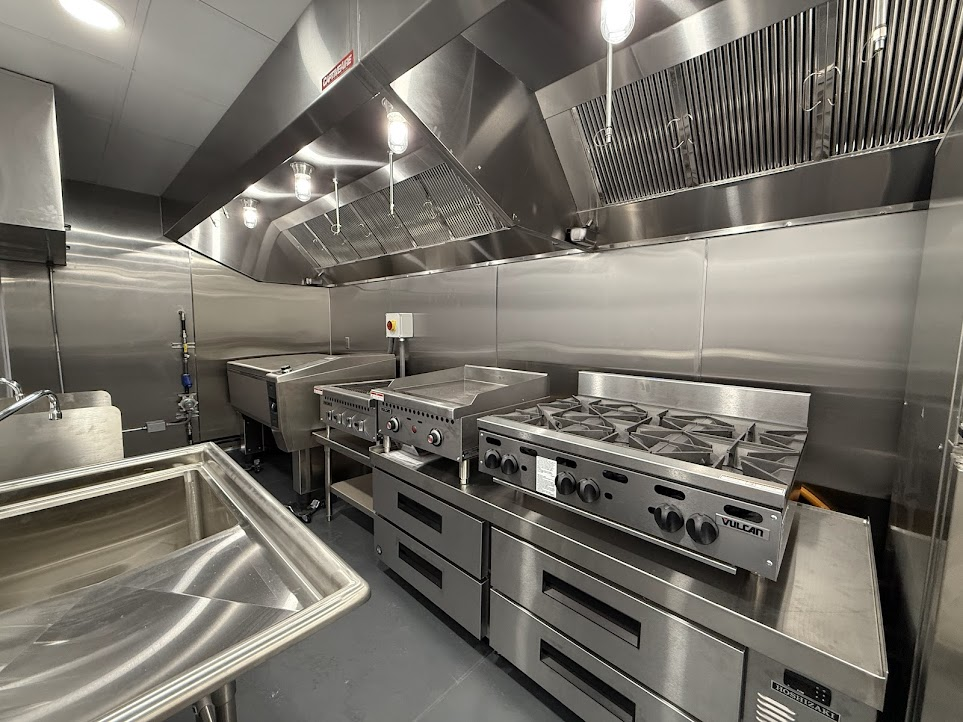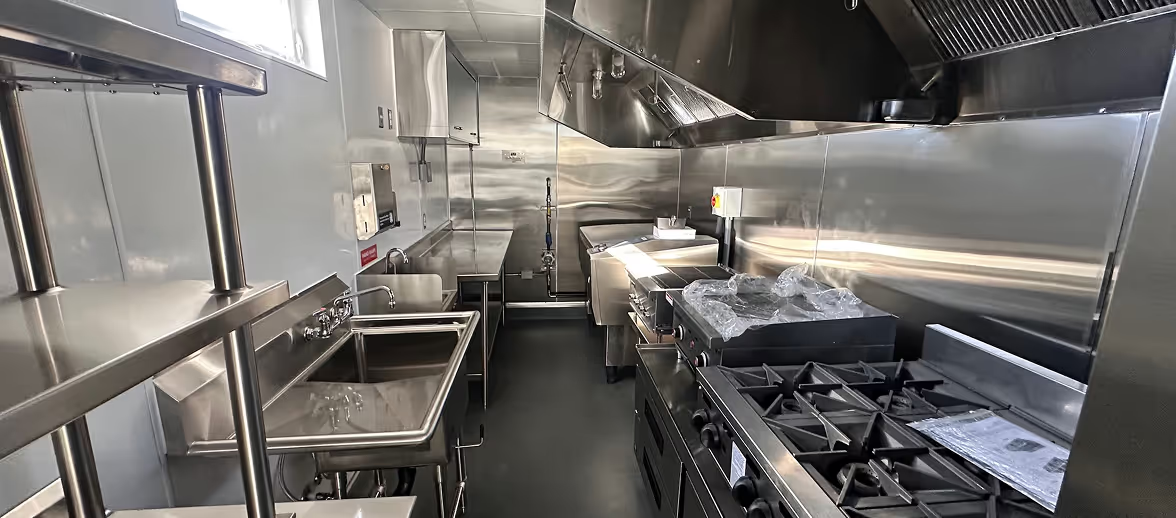.jpeg)
Introduction
Renting a mobile kitchen is an ideal solution for temporary culinary needs, but are you overlooking key components that can make or break your operation? A mobile kitchen rental unit is just the starting point. The right add-ons transform a basic trailer into a fully functional, compliant, and efficient food-production facility. According to the National Association of County and City Health Officials (NACCHO), essential components are critical for compliance with food safety standards and local health regulations. Whether you're managing disaster relief efforts, catering large-scale events, or supporting hotel renovations, equipping your mobile kitchen properly is very important.
This article outlines crucial add-ons to consider for your mobile kitchen rental, explains their importance, and offers practical tips to help you select the right components without overspending or compromising on functionality.
-p-800%2520(1).jpeg)
Why Add-Ons Matter in Mobile Kitchen Rentals
Customization for Specific Use Cases
Every mobile kitchen deployment is unique. A pop-up event may require warming stations and rapid prep counters, while a hotel facing kitchen downtime might need comprehensive dishwashing setups and ample dry storage. Add-ons let you tailor your rental precisely to your operational needs, whether you’re serving 50 or 5,000 meals per day.
Safety, Efficiency & Compliance
Certain add-ons aren’t just operational enhancements; they're essential for compliance. Local health departments frequently mandate specific equipment to meet sanitation, safety, and food-handling standards. Selecting these components proactively helps avoid operational disruptions and ensures regulatory adherence.
Operational Flow
Thoughtful equipment choices and layouts improve your kitchen’s workflow, reduce staff fatigue, and increase service efficiency. For example, additional prep stations help minimize bottlenecks, extra refrigeration units expand storage capacity, and effective waste disposal systems maintain cleanliness. Investing in the right add-ons streamlines operations, ensuring smooth, efficient performance even during peak service times.

Essential Mobile Kitchen Add-Ons Needed
Propane Tanks
Propane is a primary fuel source for many mobile kitchens, powering everything from stovetops to ovens. Renting propane tanks alongside your mobile kitchen ensures uninterrupted cooking operations.
Why It Matters: Propane burns efficiently and provides a consistent heat source. According to the U.S. Department of Energy, propane appliances can reduce energy costs by up to 50% compared to their electric counterparts.
Note: Mobile Culinaire trailers come equipped with propane tanks ranging from 50 to 100 gallons.
Tip: Ensure your propane tanks are inspected regularly to meet safety standards. To ensure a reliable gas supply, you should coordinate with your local gas company and establish a regular refill schedule to avoid any disruptions.
.png)
Power Generators
A dependable power generator can be incredibly useful for running refrigerators, lighting and cooking equipment in areas without direct access to electricity. Renting in a good generator can ensure continuous power supply, especially for remote locations or outdoor events.
Why It Matters: A reliable generator ensures continuous power supply during outdoor events or in remote locations. The average cost of renting a generator ranges from $65 to $125 per day, depending on capacity.
Note: Mobile Culinaire’s kitchen can both connect to the grid or to an electric generator. Our team will provide the exact electrical requirements.
Tip: Choose generators with low noise levels (<60 decibels) for events in noise-sensitive areas.
.png)
Water Tanks
When it comes to mobile kitchens, it is important to have clean water for food preparation, cooking and cleaning. Therefore, portable water tanks provide a reliable water source when on-site water connections aren’t available. Pairing your mobile kitchen rental with sufficient water storage ensures seamless culinary operations.
Why It Matters: The CDC highlights the importance of safe water management to prevent contamination and ensure compliance with health codes.
Note: Mobile Culinaire kitchens typically connect to a fresh water source using a standard garden hose or a ¾-inch fitting. If an on-site connection isn’t available, we offer water tanks as an alternative.
Tip: Hiring a professional plumber for setup ensures proper installation and prevents leaks. A typical 250-gallon tank can support a day’s operations for most mobile kitchens.
Waste Water Tanks
Equally important as clean water is a proper system for waste water disposal. Waste water tanks can manage gray water effectively, ensuring compliance with health and safety regulations.
Why It Matters: Poor wastewater management can lead to penalties and operational delays.
Note: Mobile Culinaire provides durable 250-gallon waste water tanks made from high-quality resistant plastic. Regular maintenance is essential, with tanks needing to be pumped weekly or bi-monthly based on your specific needs. Moreover, it is also important to have a grease trap in place.
Tip: For waste water drainage, there are 2 options:
- The first and recommended method is to hire a professional plumber who can install a waste line with a grease trap, allowing the waste to be drained into a nearby sewer system.
- Alternative solution would be to use a waste water tank (available to lease from Mobile Culinaire).

Grease Traps
Cooking in a mobile kitchen can often generate grease, which must be managed in order to maintain hygiene and prevent clogs. Therefore, grease traps are essential for capturing and storing grease before it enters waste water systems. Including this add-on can ensure your cooking operations remain environmentally compliant and mess-free.
Why It Matters: According to the Environmental Protection Agency (EPA), grease build-up is one of the leading causes of sewer overflows. Installing a grease trap is both an operational and legal necessity.
Note: A 40 lb. grease trap is typically needed, which must be serviced regularly by a professional to maintain efficiency and compliance with local health codes.
Tip: Schedule grease trap cleaning every 1-3 months, depending on usage, to avoid blockages and costly repairs.

Decks & Ramps
Mobile kitchens are mounted on trailers, making decks and ramps a mandatory feature for safe and easy access. They provide safe and efficient entry and exit points for staff, as well as additional workspace or staging areas. These structures are even more valuable for large scale operations or events.
Why It Matters: OSHA requires businesses to provide safe entry points to work areas, making decks and ramps essential for compliance.
Tip: Opt for non-slip materials to prevent accidents, especially in wet or icy conditions.

Covered Alleys
Covered alleys provide a sheltered workspace that protects kitchen staff and equipment from harsh weather conditions such as rain, wind, and direct sunlight. These structures are especially valuable for outdoor operations, multi-day events, and unpredictable climates.
Why It Matters: Maintaining a clean, safe, and climate-controlled working environment is essential for food safety and staff productivity. Covered alleys help shield your setup from environmental contaminants and ensure consistent operations regardless of weather.
Tip: In certain regions, covered alleys are mandatory to comply with local health regulations. Therefore, you should verify local regulations.
Dry and Cold Storage
Last but not least, storage is a crucial consideration for mobile kitchen rental operations. Dry storage provide space for non-perishable ingredients and utensils, whereas cold storage ensures proper refrigeration for perishable items.
Why It Matters: The USDA estimates that improper food storage contributes to 20% of foodborne illness outbreaks. Ensuring proper refrigeration and dry storage prevents spoilage and contamination.
Note: Mobile Culinaire includes dry and cold storage in corresponding models, so that you have integrated solutions ready to go!
Optional Add-Ons for Enhanced Functionality
Cooking Line Extensions (Griddles, Steamers, Fryers)
Specialized appliances such as deep fryers, flat-top griddles, pasta cookers, and tilt skillets can significantly expand your cooking capabilities. These tools allow you to tailor the mobile kitchen to your specific menu.
Why It Matters: Versatile cooking equipment enables you to offer a wider variety of dishes, increases throughput, and improves efficiency.
Tip: Evaluate your menu carefully to choose equipment that provides maximum utility and ROI.
.jpeg)
Security & Locking Systems
Security systems such as reinforced doors, window bars, and GPS tracking help safeguard your mobile kitchen from theft and unauthorized access.
Why It Matters: Protecting your assets is critical, especially for extended deployments, overnight setups, or remote locations. Proper security minimizes downtime and loss.
Tip: Regularly test locking mechanisms and maintain security equipment to avoid vulnerabilities.
Lighting Enhancements (Interior/Exterior)
Adequate lighting is essential for both safety and productivity, especially in low-light or nighttime environments. Interior task lighting and exterior floodlights help maintain visibility and efficiency.
Why It Matters: Poor lighting can lead to accidents and reduce productivity. Enhanced lighting ensures safe working conditions and smooth operations around the clock.
Tip: Opt for energy-efficient LED lighting to reduce operational costs.
Waste Bins & Recycling Stations
Organized waste management systems, including designated bins and recycling stations, are essential for keeping your kitchen clean and compliant with environmental regulations.
Why It Matters: Proper waste handling reduces health hazards and supports compliance with EPA guidelines.
Tip: Clearly marked recycling bins improve participation and reduce waste contamination.
Serving Windows & Holding Cabinets
Pass-through serving windows and heated holding cabinets allow for smoother service and temperature control, especially during large events or peak hours.
Why It Matters: These add-ons help maintain food quality, reduce waste, and improve the speed and efficiency of service.
Tip: Select heated cabinets with adjustable temperature controls to suit varied menu requirements.
.jpeg)
Choosing the Right Add-Ons for Your Mobile Kitchen Type
Catering Events & Pop-Up Restaurants
For fast-paced, high-turnover service environments, prioritize food prep efficiency, ample storage, and presentation-focused tools. Add-ons such as quick-serve layouts, warming equipment, and backup power generators help maintain speed, food quality, and customer satisfaction during busy service periods.
Note: For more information on when and why mobile kitchens are rented for events and festivals, read our article here.
Disaster Relief & Emergency Response
When responding to crises, speed, volume, and resilience are non-negotiable. Equip your mobile kitchen with large-capacity refrigeration, on-site generators, and reinforced sanitation systems to serve thousands of meals daily in unpredictable conditions.
Note: For more information on when and why mobile kitchens are rented for emergency response and disaster relief, read our article here.
Construction Site or Remote Crew Use
In rugged or off-grid locations, self-sufficiency and durability are key. Look for add-ons like reinforced flooring, portable handwashing sinks, and off-grid power solutions that ensure uninterrupted operations, regardless of terrain or access to utilities.
Hotel & Resort Kitchen Renovation
Luxury properties undergoing renovation require a mobile kitchen that mirrors their high standards. Recommended add-ons include dishwashing stations, comprehensive compliance equipment, and custom cooking lines that maintain seamless service without sacrificing quality or efficiency.
Example: During a five-month renovation, a prestigious country club in California utilized a 2x53' mobile kitchen solution from Mobile Culinaire to ensure uninterrupted, high-quality foodservice. The setup featured walk-in coolers, dry storage, and a dedicated dishwashing area, all strategically designed for long-term use and maximum operational efficiency.
Note: For more information on how mobile kitchen rentals support hotels and resorts, read our article here.
%2520(1).png)
Step-by-Step Planning Checklist for Selecting Add-Ons
1. Define Service Volume and Type: Determine the number and type of meals you'll serve to ensure the add-ons match your capacity and menu requirements.
2. Map Kitchen Flow and Identify Gaps: Create a detailed kitchen workflow plan to pinpoint bottlenecks, optimize operational efficiency, and address missing elements promptly.
3. Consult with Vendors on Compatibility: Work closely with your equipment provider to ensure all add-ons integrate seamlessly with existing kitchen infrastructure, preventing compatibility issues.
4. Review Health and Safety Regulations: Verify that all equipment and add-ons meet local health codes and safety standards, ensuring a smooth inspection and permitting process.
5. Choose a Rental Provider with Add-On Options: Reputable mobile kitchen rental companies offer a wide range of essential add-ons. These offerings simplify your planning process by bundling everything you need into a single, streamlined rental experience.
Why Choose Mobile Culinaire’s Mobile Kitchen Rentals?
Mobile Culinaire provides turnkey mobile kitchen solutions designed to simplify operations, enhance efficiency, and ensure complete compliance. With Mobile Culinaire, you can confidently handle any culinary operation, no matter the complexity or scale. Here's what sets us apart:
- Tailored Solutions & Expert Guidance: We collaborate closely with you to select the ideal equipment and layout optimized specifically for your menu, operational flow, and service volume.
- Hassle-Free Compliance: Our rentals are built to meet or exceed all local health, safety, and regulatory standards, ensuring stress-free inspections and permits.
- All-in-One Convenience: Enjoy a seamless journey with comprehensive delivery, setup and ongoing support, designed to streamline your operations, minimize downtime, and maximize your return on investment.
- Complete Range of Add-Ons: We also offer a full suite of essential add-ons so you don’t have to source equipment from multiple vendors.
.jpeg)
Final Thoughts
Add-ons aren’t just accessories, they’re essential to transforming a basic mobile kitchen rental into a high-performing and code-compliant culinary operation. From cold storage and propane systems to safety ramps and grease traps, the right equipment choices impact everything from food safety to workflow efficiency and profitability.
Investing in the right add-ons ensures your kitchen is not only functional but future-ready and capable of handling high volumes, meeting regulatory demands, and delivering consistent results.
Ready to build a mobile kitchen that performs as well as your team does?
Explore Mobile Culinaire’s mobile kitchen rentals or contact our experts to customize your ideal setup today. Let’s make your next project seamless, safe, and successful.
Disclaimer: This article is for informational purposes only and does not constitute legal advice. Requirements may vary by location, so consult local authorities and professionals for specific guidelines.
People Also Ask (FAQ)
What are the essential add-ons for a mobile kitchen rental?
Core add-ons include propane tanks, power generators, water and waste tanks, grease traps, and cold storage. These components ensure safe operations, regulatory compliance, and reliable food production in any setting.
How do I choose the right add-ons for my mobile kitchen rental?
Start by evaluating your service type, expected volume, menu complexity, and site conditions. Then consult with your provider to select equipment that enhances workflow, ensures compliance, and supports your operational goals.
What add-ons should hotels consider during kitchen renovations?
Hotels and resorts typically require dishwashing stations, grease traps, covered alleys, and customizable cooking lines to match heir upscale standards. These add-ons ensure continuity of service and brand quality during downtime.
Testimonial

"What is standing out when you look at the mobile kitchen operation is the efficiency that we can really achieve because it's built for that."
Tell us about your kitchen needs and request a quote.
.png)
Turnkey mobile kitchen
.png)
Proudly made in-house in the USA
.png)
Commercial grade kitchen equipment
.png)
Code-compliant
Trusted by Industry Leaders




.gif)

%20(1).avif)
%20(1).avif)
%20(1).avif)